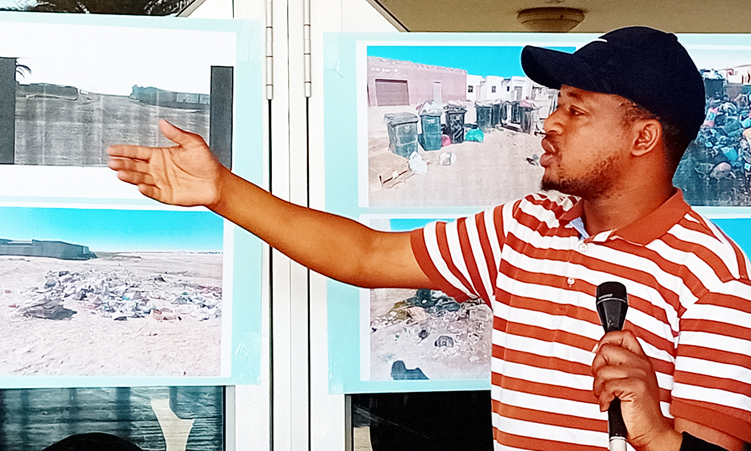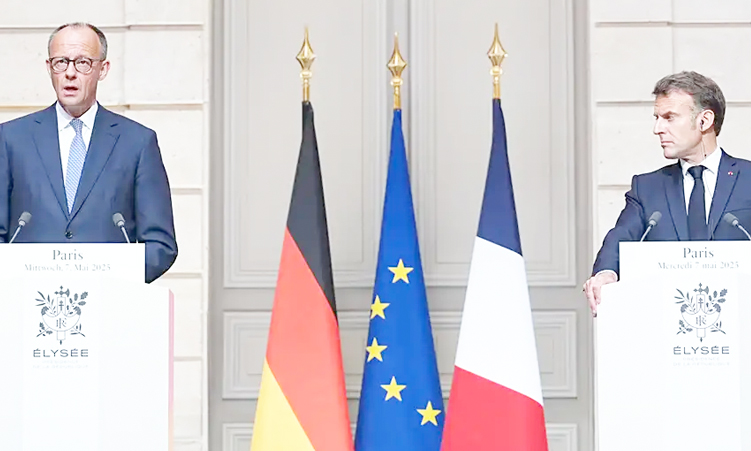THE Prime Minister’s meeting with the Basic Income Grant (BIG) Coalition last Monday, in which Cabinet’s rejection of the idea was conveyed to the group, was not intended for the public’s ears, the coalition stressed last week.
The BIG Coalition on Thursday responded to a news report aired on the Namibian Broadcasting Corporation (NBC) television news on Monday, saying the information was leaked to the media, and that the report “misrepresented” the views expressed there. “While the meeting was held in camera, no journalists had been invited and the delegation understood this as a non-public meeting,” Bishop Zephania Kameeta, representing the coalition, told a news conference.”It is in this context that the Coalition would like to express its astonishment that the Prime Minister’s office has sought to take the discussion into the public at this point in time,” he said.Kameeta further said that the coalition was dismayed that the broadcast quoted him, the leader of the delegation, as saying that the coalition would now meet in order to come up with alternate solutions to the plight of the poor.”What I in fact said was that I will take the Cabinet’s decision to the coalition and that the coalition would formulate its response, but no alternative solutions featured or were mentioned during the whole meeting from the side of the delegation,” Kameeta said.The bishop further took issue with Prime Minister Nahas Angula’s use of the biblical verse “in the sweat of your face shall you eat bread” (Genesis 3:19), as justification for not accepting the BIG idea.”Where are the Ramatex workers from Katutura or the people on the DRC dump (site) going to work with sweat on their face for their bread? Where are they going to get the modest resources from the start to take their economic life into their own hands?” he asked, referring to the Malaysian-owned textile factory’s threats of leaving Namibia, and a report on the same news broadcast of people living on the DRC dumpsite in Swakopmund, searching for food amongst medical waste dumped there.”Namibians are not lazy to work with sweat on their face,” he continued.”The question is rather, when are we prepared to change the structural injustices of the economy by giving resources to the people directly instead of giving them to exploitative foreign investors building and dumping sweatshops?” He reminded media practitioners present that the idea for a BIG was in fact formed by Government’s own tax consortium, the Namtax Commission.Namtax said in 2002 that “following an extensive review of the relevant literature and an analysis of possible alternative strategies, we found that by far the best method of addressing poverty and inequality would be a universal income grant.”For this reason, Kameeta said Government’s response last Monday that such a grant would make no economic sense stood in contrast to the findings of Namtax and the BIG Coalition.Last week, Government said implementing the BIG could only become a reality if either the coalition raised a fraction of the funds needed, or if Government abolished the many social grants it already has in place.These include social pensions, war veterans’ grants, foster parents’ allowances, places-of-safety allowances and housing grants.Kameeta said the coalition rejected this idea of re-prioritising funds from the poor, as special needs would still exist despite the introduction of BIG.The coalition said other ways of funding the idea could be considered, for example through value-added tax (VAT) and donor funding.”While the meeting was held in camera, no journalists had been invited and the delegation understood this as a non-public meeting,” Bishop Zephania Kameeta, representing the coalition, told a news conference.”It is in this context that the Coalition would like to express its astonishment that the Prime Minister’s office has sought to take the discussion into the public at this point in time,” he said.Kameeta further said that the coalition was dismayed that the broadcast quoted him, the leader of the delegation, as saying that the coalition would now meet in order to come up with alternate solutions to the plight of the poor.”What I in fact said was that I will take the Cabinet’s decision to the coalition and that the coalition would formulate its response, but no alternative solutions featured or were mentioned during the whole meeting from the side of the delegation,” Kameeta said.The bishop further took issue with Prime Minister Nahas Angula’s use of the biblical verse “in the sweat of your face shall you eat bread” (Genesis 3:19), as justification for not accepting the BIG idea.”Where are the Ramatex workers from Katutura or the people on the DRC dump (site) going to work with sweat on their face for their bread? Where are they going to get the modest resources from the start to take their economic life into their own hands?” he asked, referring to the Malaysian-owned textile factory’s threats of leaving Namibia, and a report on the same news broadcast of people living on the DRC dumpsite in Swakopmund, searching for food amongst medical waste dumped there.”Namibians are not lazy to work with sweat on their face,” he continued.”The question is rather, when are we prepared to change the structural injustices of the economy by giving resources to the people directly instead of giving them to exploitative foreign investors building and dumping sweatshops?” He reminded media practitioners present that the idea for a BIG was in fact formed by Government’s own tax consortium, the Namtax Commission.Namtax said in 2002 that “following an extensive review of the relevant literature and an analysis of possible alternative strategies, we found that by far the best method of addressing poverty and inequality would be a universal income grant.”For this reason, Kameeta said Government’s response last Monday that such a grant would make no economic sense stood in contrast to the findings of Namtax and the BIG Coalition.Last week, Government said implementing the BIG could only become a reality if either the coalition raised a fraction of the funds needed, or if Government abolished the many social grants it already has in place.These include social pensions, war veterans’ grants, foster parents’ allowances, places-of-safety allowances and housing grants.Kameeta said the coalition rejected this idea of re-prioritising funds from the poor, as special needs would still exist despite the introduction of BIG.The coalition said other ways of funding the idea could be considered, for example through value-added tax (VAT) and donor funding.
Stay informed with The Namibian – your source for credible journalism. Get in-depth reporting and opinions for
only N$85 a month. Invest in journalism, invest in democracy –
Subscribe Now!










